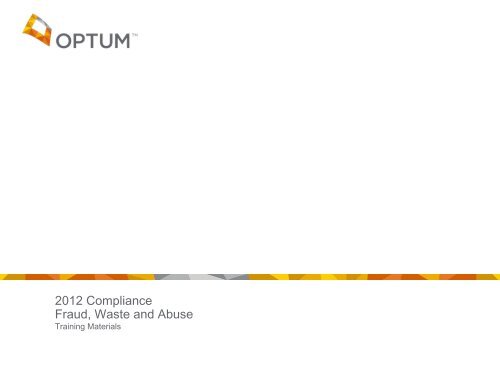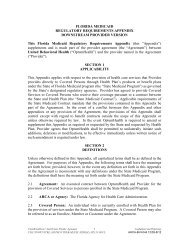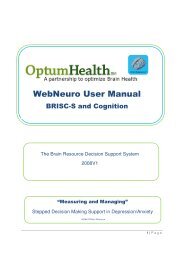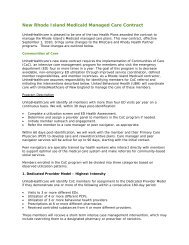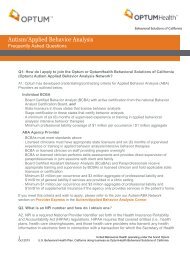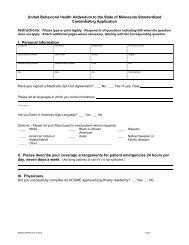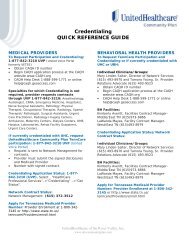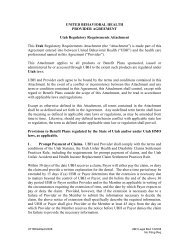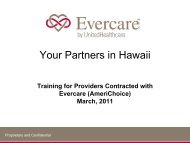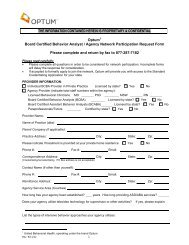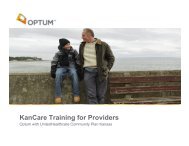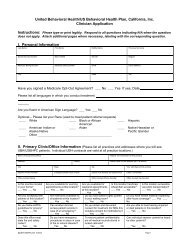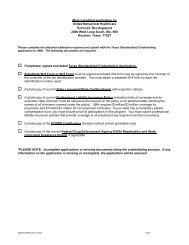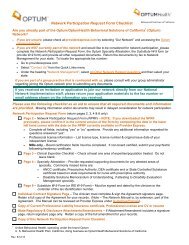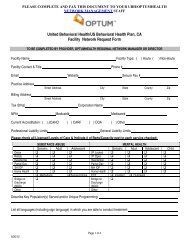2012 Compliance: Fraud, Waste and Abuse (training - Ubhonline.com
2012 Compliance: Fraud, Waste and Abuse (training - Ubhonline.com
2012 Compliance: Fraud, Waste and Abuse (training - Ubhonline.com
You also want an ePaper? Increase the reach of your titles
YUMPU automatically turns print PDFs into web optimized ePapers that Google loves.
<strong>2012</strong> <strong>Compliance</strong><br />
<strong>Fraud</strong>, <strong>Waste</strong> <strong>and</strong> <strong>Abuse</strong><br />
Training Materials
Overview<br />
• The Centers for Medicare & Medicaid Services (CMS) requires Medicare<br />
Advantage Organizations (MAO) <strong>and</strong> Part D Plan Sponsors to have effective<br />
<strong>com</strong>pliance programs which include:<br />
– Communicating general <strong>com</strong>pliance information <strong>and</strong> distributing St<strong>and</strong>ards of<br />
Conduct.<br />
– Establishing effective lines of <strong>com</strong>munication.<br />
– Conducting effective fraud, waste, <strong>and</strong> abuse <strong>training</strong>.<br />
– Reviewing for exclusion <strong>and</strong> debarment from Federal health care programs.<br />
• These requirements apply to both the MAO/Plan Sponsor – <strong>and</strong> first tier,<br />
downstream, <strong>and</strong> related entity – employees (including temporary workers<br />
<strong>and</strong> volunteers), the CEO, senior administrators or managers, governing body<br />
members <strong>and</strong> downstream entities or subcontractors.<br />
United Behavioral Health (UBH) operating under the br<strong>and</strong> Optum<br />
U.S. Behavioral Health Plan of California (USBHPC) doing business as OptumHealth Behavioral Solutions of California<br />
Confidential property of Optum. Do not distribute or reproduce without express permission from Optum.<br />
2
Overview, cont.<br />
• In regulations effective June 7, 2010, CMS implemented a “deeming” exception<br />
which exempts first tier, downstream, <strong>and</strong> related entities who are enrolled in<br />
Medicare Parts A or B from the annual fraud, waste, <strong>and</strong> abuse <strong>training</strong> <strong>and</strong><br />
education requirements.<br />
– To qualify for this deemed status, you <strong>and</strong>/or your organization must have met the<br />
certification requirements through enrollment into Parts A or B of the Medicare<br />
program or accreditation as a supplier of Durable Medical Equipment, Prosthetics,<br />
Orthotics, <strong>and</strong> Supplies (DMEPOS).<br />
– If you or your organization qualifies for this deemed status, please retain records or<br />
evidence of your certification in your files. You may be asked to provide<br />
documentation for audit purposes.<br />
– If you or your organization have already <strong>com</strong>pleted a fraud, waste, <strong>and</strong> abuse <strong>training</strong><br />
program – whether through your own program or <strong>training</strong> with another health plan<br />
sponsor – AND that <strong>training</strong> meets CMS requirements, Optum will accept<br />
documentation of that <strong>training</strong> in lieu of the administration of this <strong>training</strong> material.<br />
– Optum (UBH <strong>and</strong>/or USBHPC) will also accept documentation confirming <strong>com</strong>pletion<br />
of the CMS Medicare Learning Network (MLN) fraud, waste, <strong>and</strong> abuse <strong>training</strong> <strong>and</strong><br />
education module.<br />
Confidential property of Optum. Do not distribute or reproduce without express permission from Optum.<br />
3
Overview, cont.<br />
– If you or your organization do not qualify for the deemed status, <strong>training</strong> is required by<br />
December 31 <strong>and</strong> annually thereafter.<br />
– Please note that there is no deemed status for the St<strong>and</strong>ards of Conduct distribution,<br />
nor the reviews for exclusion <strong>and</strong> debarment from Federal health care programs.<br />
• Please maintain records of all <strong>training</strong> – including dates, methods of <strong>training</strong>,<br />
materials used for <strong>training</strong>, identification of trained employees via sign-in sheets<br />
or other methods, etc. – as well as records for St<strong>and</strong>ards of Conduct<br />
distribution <strong>and</strong> all exclusion <strong>and</strong> debarment review activity.<br />
• Documentation demonstrating <strong>com</strong>pletion of <strong>com</strong>pliance requirements at the<br />
first tier, downstream, <strong>and</strong> related entity employee level must be retained for a<br />
minimum of ten years <strong>and</strong> made available upon request to Optum, CMS, or<br />
agents acting on behalf of CMS<br />
• Optum, CMS, or agents of CMS may request such records to verify that the<br />
required activity occurred.<br />
Confidential property of Optum. Do not distribute or reproduce without express permission from Optum.<br />
4
Overview, cont.<br />
• If you or your organization has contracted with other entities or persons to<br />
provide health care <strong>and</strong>/or administrative services on behalf of your patients<br />
covered by UnitedHealthcare or another Plan Sponsor you service on behalf of<br />
Optum, you must provide this <strong>training</strong> material to your subcontractor for <strong>training</strong><br />
<strong>and</strong> ensure that records confirming <strong>training</strong> are maintained by the subcontractor<br />
<strong>and</strong> any other entity that they may have contracted with to perform the services.<br />
• All contracted entities should have policies <strong>and</strong> procedures to prevent, detect,<br />
<strong>and</strong> correct fraud, waste, <strong>and</strong> abuse – including effective <strong>training</strong>, reviews for<br />
excluded or debarred status, reporting mechanisms, <strong>and</strong> methods to respond to<br />
detected offenses.<br />
Confidential property of Optum. Do not distribute or reproduce without express permission from Optum.<br />
5
Overview, cont.<br />
• Contracted Entity Definitions:<br />
– First Tier: Any party that enters into a written agreement with a plan sponsor<br />
to provide administrative or health care services for a Medicare eligible<br />
individual under Medicare Advantage or Part D programs.<br />
• Examples include, but are not limited to: pharmacy benefit manager (PBM),<br />
contracted hospitals or providers.<br />
– Downstream: Any party that enters into a written agreement below the level<br />
of the arrangement between a sponsor <strong>and</strong> a first tier entity for the provision<br />
of administrative or health care services for a Medicare eligible individual<br />
under Medicare Advantage or Part D programs.<br />
• Examples include, but are not limited to: pharmacies, claims processing firms,<br />
billing agencies.<br />
– Related: Any entity that is related to the sponsor by <strong>com</strong>mon ownership or<br />
control <strong>and</strong> 1) performs some of the sponsor’s management of functions<br />
under a contract of delegation, 2) furnishes services to Medicare enrollees<br />
under an oral or written agreement, or 3) leases real property or sells<br />
materials to the sponsor at a cost of more than $2500 during a contract<br />
period.<br />
Confidential property of Optum. Do not distribute or reproduce without express permission from Optum.<br />
6
<strong>Compliance</strong> Expectations
Course Outline<br />
• <strong>Compliance</strong> Expectations:<br />
• CMS – Role <strong>and</strong> Definition<br />
• Seven Elements of an Effective <strong>Compliance</strong> Program<br />
• St<strong>and</strong>ards of Conduct Distribution<br />
• Effective Lines of Communication<br />
• Effective Training <strong>and</strong> Communication<br />
• Reviews for exclusion <strong>and</strong> debarment from Federal<br />
health care programs.<br />
• CMS Medicare Learning Network <strong>Fraud</strong>, <strong>Waste</strong>, <strong>and</strong> <strong>Abuse</strong> Training Module Option<br />
• Optum <strong>Fraud</strong>, <strong>Waste</strong>, <strong>and</strong> <strong>Abuse</strong> Training Materials<br />
• Definitions<br />
• Pertinent Laws <strong>and</strong> Regulations<br />
• Examples of <strong>Fraud</strong>, <strong>Waste</strong>, <strong>and</strong> <strong>Abuse</strong><br />
• Reporting Obligation <strong>and</strong> Mechanisms<br />
• Additional Resources<br />
• Training Quiz <strong>and</strong> Self Assessment<br />
Confidential property of Optum. Do not distribute or reproduce without express permission from Optum.<br />
8
CMS Role <strong>and</strong> Definition<br />
• The Centers for Medicare & Medicaid Services (CMS) is a government<br />
agency within the U.S. Department of Health <strong>and</strong> Human Services.<br />
• CMS is responsible for oversight of the Medicare Program – including health<br />
plan sponsors of programs such as Medicare Advantage (MA), Medicare<br />
Advantage Prescription Drug (MAPD), <strong>and</strong> Prescription Drug Plans (PDP).<br />
• The main or central office for CMS is located in Baltimore, MD. CMS also<br />
has 10 Regional Offices – in Atlanta, Boston, Chicago, Dallas, Denver,<br />
Kansas City, New York, Philadelphia, San Francisco, <strong>and</strong> Seattle.<br />
• CMS publishes guidance on how to <strong>com</strong>ply with the rules <strong>and</strong> regulations of<br />
MA, MAPD, <strong>and</strong> PDP plans through the Medicare Managed Care Manual<br />
<strong>and</strong> the Prescription Drug Benefit Manual. First tier, downstream, <strong>and</strong><br />
related entities should refer to <strong>and</strong> be familiar with these materials to ensure<br />
<strong>com</strong>pliance with the Medicare requirements related to their delegated<br />
functions.<br />
• See ‘Additional Resources’ at the end of this presentation for a link to the CMS Medicare Managed Care Manual <strong>and</strong> Prescription Drug Benefit Manual.<br />
Confidential property of Optum. Do not distribute or reproduce without express permission from Optum.<br />
9
Seven Elements of an Effective <strong>Compliance</strong> Program<br />
• Federal law requires Medicare Advantage <strong>and</strong> Part D plan sponsors to<br />
implement <strong>and</strong> maintain an effective <strong>com</strong>pliance program that<br />
incorporates measures to detect, prevent, <strong>and</strong> correct fraud, waste, <strong>and</strong><br />
abuse.<br />
• The Health & Human Services (HHS) Office of Inspector General (OIG) has<br />
identified seven core elements of a <strong>com</strong>pliance program:<br />
1. Written St<strong>and</strong>ards of Conduct – An organization’s Code of Conduct,<br />
policies, procedures <strong>and</strong> other written operating guidelines.<br />
2. High Level Oversight – designate a leader(s), including an established<br />
<strong>com</strong>pliance <strong>com</strong>mittee, responsible for implementing <strong>and</strong> monitoring the<br />
<strong>com</strong>pliance program.<br />
3. Effective Training <strong>and</strong> Education – develop <strong>and</strong> implement regular<br />
<strong>and</strong> effective <strong>training</strong> programs, such as this one.<br />
Confidential property of Optum. Do not distribute or reproduce without express permission from Optum.<br />
10
Seven Elements of an Effective <strong>Compliance</strong> Program<br />
4. Effective Lines of Communication – ongoing <strong>com</strong>munication <strong>and</strong><br />
awareness about <strong>com</strong>pliance expectations, including a system to receive,<br />
record <strong>and</strong> respond to <strong>com</strong>pliance questions or reports of potential non<strong>com</strong>pliance<br />
either directly or anonymously.<br />
5. Enforcement <strong>and</strong> Disciplinary Guidelines – policies to consistently<br />
enforce st<strong>and</strong>ards, including enforcement of non-retaliation st<strong>and</strong>ards.<br />
6. Auditing <strong>and</strong> Monitoring – systematic checks for <strong>com</strong>pliance with<br />
requirements through auditing <strong>and</strong> monitoring activities.<br />
7. Response to Identified Issues – procedures for responding to detected<br />
offenses by taking the reasonable steps necessary to promptly respond<br />
to <strong>and</strong> prevent further non-<strong>com</strong>pliance or misconduct – including<br />
corrective action as needed.<br />
Additional information on CMS requirements <strong>and</strong> re<strong>com</strong>mendations for <strong>com</strong>pliance programs <strong>and</strong> addressing fraud, waste, <strong>and</strong> abuse is<br />
available within Chapter 9 of the CMS Prescription Drug Benefit Manual <strong>and</strong> Chapter 21 of the CMS Medicare Managed Care Manual.<br />
See ‘Additional Resources’ at the end of this presentation for a link.<br />
Confidential property of Optum. Do not distribute or reproduce without express permission from Optum.<br />
11
St<strong>and</strong>ards of Conduct Distribution<br />
• As part of the Optum <strong>com</strong>pliance program, the st<strong>and</strong>ards of conduct that<br />
govern <strong>and</strong> provide guidelines for ethical behavior are set forth in the<br />
UnitedHealth Group Code of Conduct.<br />
• Optum – <strong>and</strong> you – have requirements related to the UnitedHealth Group Code<br />
of Conduct.<br />
– Optum must make you aware of <strong>and</strong> make available to you our Code of Conduct.<br />
– First tier, downstream, <strong>and</strong> related entities working on our Medicare Advantage, Part<br />
D programs (including contracted providers) must distribute either our Code of<br />
Conduct to their employees – OR – distribute your own <strong>com</strong>parable St<strong>and</strong>ards of<br />
Conduct that meets CMS expectations.<br />
• To address this requirement, review <strong>and</strong> access the UnitedHealth Group Code<br />
of Conduct, available at unitedhealthgroup.<strong>com</strong> > About > Ethics & Integrity,<br />
<strong>and</strong> provide this – OR – your own <strong>com</strong>parable st<strong>and</strong>ards of conduct to your<br />
employees / subcontractors.<br />
Confidential property of Optum. Do not distribute or reproduce without express permission from Optum.<br />
12
Effective Lines of Communication<br />
• Medicare Advantage Organizations <strong>and</strong> Part D Plan Sponsors must establish<br />
<strong>and</strong> implement effective lines of <strong>com</strong>munication that allow confidential <strong>and</strong><br />
anonymous good faith reporting of potential <strong>com</strong>pliance issues that are<br />
accessible to all.<br />
– To report suspected non-<strong>com</strong>pliance to Optum, please utilize any of the following<br />
resources:<br />
• Your Optum account manager or business contact<br />
• The Provider Service contact number (listed at the end of this presentation)<br />
• The UnitedHealth Group <strong>Compliance</strong> & Ethics HelpCenter 1.800.455.4521<br />
• Optum expects all first tier, downstream, <strong>and</strong> related entities to also establish<br />
effective lines of <strong>com</strong>munication that allow their employees to ask questions,<br />
request <strong>com</strong>pliance support, or report suspected non-<strong>com</strong>pliance or potential<br />
fraud, waste, <strong>and</strong> abuse.<br />
Optum expressly prohibits retaliation against employees or<br />
contractors who, in good faith, report or participate in the<br />
investigation of <strong>com</strong>pliance concerns.<br />
Confidential property of Optum. Do not distribute or reproduce without express permission from Optum.<br />
13
Effective Training <strong>and</strong> Education<br />
• Medicare Advantage Organizations <strong>and</strong> Part D Plan Sponsors are required to<br />
establish, implement, <strong>and</strong> provide effective <strong>training</strong> <strong>and</strong> education, including<br />
both general <strong>com</strong>pliance <strong>training</strong> <strong>and</strong> fraud, waste, <strong>and</strong> abuse <strong>training</strong>.<br />
• Optum requires <strong>com</strong>pletion of fraud, waste, <strong>and</strong> abuse <strong>training</strong> <strong>and</strong> education<br />
upon hire <strong>and</strong> annually thereafter by all first tier, downstream, <strong>and</strong> related entity<br />
employees (including temporary workers <strong>and</strong> volunteers), the CEO, senior<br />
administrators or managers, governing body members <strong>and</strong> downstream entities<br />
or subcontractors.<br />
– Documentation demonstrating <strong>com</strong>pletion of <strong>training</strong> at the first tier, downstream, <strong>and</strong><br />
related entity employee level must be retained for a minimum of ten years <strong>and</strong> made<br />
available upon request to Optum, CMS, or agents acting on behalf of CMS.<br />
• Optum is required to <strong>com</strong>municate general <strong>com</strong>pliance information to its first<br />
tier, downstream, <strong>and</strong> related entities. General <strong>com</strong>pliance information has<br />
been included in these materials to serve that purpose. First tier, downstream,<br />
<strong>and</strong> related entities should <strong>com</strong>municate this information to their employees<br />
<strong>and</strong> subcontractors.<br />
• Please also refer to other materials you receive from Optum for additional<br />
general <strong>com</strong>pliance information, including but not limited to:<br />
– Provider manuals, newsletters, contracts <strong>and</strong> associated agreements, online<br />
<strong>com</strong>munication materials, fax blasts, <strong>and</strong> Informational mailings or emails.<br />
Confidential property of Optum. Do not distribute or reproduce without express permission from Optum.<br />
14
Exclusion <strong>and</strong> Debarment Review Requirements<br />
• Payment related to Medicare or Medicaid benefit programs must not be made<br />
for items or services furnished or prescribed by an excluded provider, person,<br />
or entity.<br />
• Our first tier, downstream, <strong>and</strong> related entities must review federal exclusion<br />
lists at the time of hire/contracting <strong>and</strong> MONTHLY thereafter to ensure that<br />
none are excluded from participating in Federal health care programs.<br />
• Review for excluded status is required for any:<br />
– First tier, downstream, <strong>and</strong> related entity employee (including temporary workers <strong>and</strong><br />
volunteers), CEO, senior administrator or manager, governing body member,<br />
downstream entity or subcontractor.<br />
• Please retain all documentation confirming the review activity was conducted<br />
<strong>and</strong> the results of the review.<br />
• If you identify an excluded party or entity employed or contracted by your<br />
organization, you must report this to Optum through either your Optum Account<br />
Manager, business contact or the UnitedHealth Group <strong>Compliance</strong> & Ethics<br />
HelpCenter at 1-800-455-4521.<br />
Confidential property of Optum. Do not distribute or reproduce without express permission from Optum.<br />
15
Exclusion <strong>and</strong> Debarment Review Requirements<br />
• For more information on these requirements <strong>and</strong> for access to the publicly<br />
accessible excluded party online databases, please see the following links:<br />
– Health <strong>and</strong> Human Services – Office of the Inspector General (HHS-OIG) List of<br />
Excluded Individuals/Entities: http://oig.hhs.gov/exclusions/index.asp<br />
– General Services Administration (GSA) List of Parties Excluded from Federal<br />
Procurement <strong>and</strong> Nonprocurement programs at System for Award Management<br />
(SAM): http://www.sam.gov.<strong>com</strong><br />
Confidential property of Optum. Do not distribute or reproduce without express permission from Optum.<br />
16
CMS MLN FWA Training Materials
CMS MLN FWA Training Module<br />
• As announced in the 05/08/<strong>2012</strong> CMS HPMS Memo entitled, ‘<strong>Fraud</strong>, <strong>Waste</strong>,<br />
<strong>and</strong> <strong>Abuse</strong> Training <strong>and</strong> Education Guidance’, CMS has developed a webbased,<br />
st<strong>and</strong>ardized fraud, waste <strong>and</strong> abuse <strong>training</strong> module that can be used<br />
by first tier, downstream, <strong>and</strong> related entities to satisfy the fraud, waste, <strong>and</strong><br />
abuse <strong>training</strong> <strong>and</strong> education requirements.<br />
• Using CMS’ <strong>training</strong> <strong>and</strong> education module is optional however this <strong>training</strong><br />
meets CMS’ fraud, waste, <strong>and</strong> abuse <strong>training</strong> requirements <strong>and</strong> Optum will<br />
accept the use of this <strong>training</strong> option by first tier <strong>and</strong> downstream entities.<br />
– The module is available through the CMS Medicare Learning Network at<br />
http://www.cms.gov/MLNProducts<br />
– From the MLN Products page follow this path:<br />
• Click the “Provider <strong>Compliance</strong>” link listed within the left side navigation panel<br />
• Under “Downloads”, choose the “Medicare Parts C <strong>and</strong> D <strong>Fraud</strong>, <strong>Waste</strong>, <strong>and</strong> <strong>Abuse</strong><br />
Training” zip file<br />
• Choose “Open’” or “Save’” to access the <strong>training</strong> module which is provided in both PDF<br />
<strong>and</strong> PowerPoint formats.<br />
• Documentation demonstrating <strong>com</strong>pletion of <strong>training</strong> at the employee level<br />
must be retained for a minimum of ten years <strong>and</strong> made available upon request<br />
to Optum, CMS, or agents acting on behalf of CMS.<br />
Confidential property of Optum. Do not distribute or reproduce without express permission from Optum.<br />
18
Optum FWA Training Materials
<strong>Fraud</strong>, <strong>Waste</strong>, <strong>and</strong> <strong>Abuse</strong> Defined<br />
• <strong>Fraud</strong> is knowingly <strong>and</strong> willfully executing, or attempting to execute, a scheme or artifice<br />
to defraud any health care benefit program or to obtain (by means of false or fraudulent<br />
pretenses, representations, or promises) any of the money or property owned by, or<br />
under the custody or control of, any health care benefit program. (18 U.S.C. § 1347)<br />
• <strong>Waste</strong> is the overutilization of services, or other practices that, directly or indirectly, result<br />
in unnecessary costs to the Medicare program.<br />
– <strong>Waste</strong> is generally not considered to be caused by criminally negligent actions but<br />
rather the misuse of resources.<br />
• <strong>Abuse</strong> includes actions that may, directly or indirectly, result in: unnecessary costs to the<br />
Medicare Program, improper payment, payment for services that fail to meet<br />
professionally recognized st<strong>and</strong>ards of care, or services that are medically unnecessary.<br />
– <strong>Abuse</strong> involves payment for items or services when there is no legal entitlement to<br />
that payment <strong>and</strong> the provider has not knowingly <strong>and</strong>/or intentionally misrepresented<br />
facts to obtain payment. <strong>Abuse</strong> cannot be differentiated categorically from fraud,<br />
because the distinction between “fraud” <strong>and</strong> “abuse” depends on specific facts <strong>and</strong><br />
circumstances, intent <strong>and</strong> prior knowledge, <strong>and</strong> available evidence, among other<br />
factors.<br />
• Source: ‘Definitions’ section of Chapter 9 of the CMS Prescription Drug Benefit Manual <strong>and</strong> Chapter 21 of the CMS Medicare Managed Care Manual.<br />
Confidential property of Optum. Do not distribute or reproduce without express permission from Optum.<br />
20
<strong>Fraud</strong>, <strong>Waste</strong>, <strong>and</strong> <strong>Abuse</strong> Policies<br />
• First tier, downstream, <strong>and</strong> related entities are obligated to establish <strong>and</strong><br />
implement policies <strong>and</strong> procedures to address fraud, waste, <strong>and</strong> abuse.<br />
• Examples of policies include but are not limited to:<br />
– Policies providing guidance to employees on how to request <strong>com</strong>pliance assistance<br />
or report suspected non-<strong>com</strong>pliance or potential fraud, waste, <strong>and</strong> abuse.<br />
– Policies expressly prohibiting retaliation against employees who, in good faith, report<br />
or participate in the investigation of <strong>com</strong>pliance concerns.<br />
– Procedures to conduct timely <strong>and</strong> reasonable inquiries to detected offenses, including<br />
applying corrective actions as necessary.<br />
Confidential property of Optum. Do not distribute or reproduce without express permission from Optum.<br />
21
Pertinent Laws <strong>and</strong> Regulations<br />
• False Claims Act<br />
• The federal False Claims Act creates liability for the submission of a claim for<br />
payment to the government that is known to be false – in whole or in part.<br />
Several states have also enacted false claims laws modeled after the federal<br />
False Claims Act.<br />
– A “claim” is broadly defined to include any submissions that results, or could result, in<br />
payment.<br />
– Under the False Claims Act, ‘knowing’ or ‘known’ means that a person:<br />
• Has actual knowledge;<br />
• Acts in deliberate ignorance of truth or falsity; or,<br />
• Acts in reckless disregard of truth or falsity.<br />
• Proof of specific intent to defraud is not required to fall within the definition of<br />
knowledge.<br />
• Claims “submitted to the government” includes claims submitted to<br />
intermediaries such as state agencies, managed care organizations, <strong>and</strong><br />
other subcontractors under contract with the government to administer<br />
healthcare benefits.<br />
Confidential property of Optum. Do not distribute or reproduce without express permission from Optum.<br />
22
Pertinent Laws <strong>and</strong> Regulations<br />
• False Claims Act, cont.<br />
Liability can also be created by the improper retention of an overpayment.<br />
• The Patient Protection <strong>and</strong> Affordable Care Act of 2010 (PPACA) or Health Care<br />
Reform Law exp<strong>and</strong>ed a provision of the False Claims Act referred to as a reverse<br />
false claim.<br />
• Overpayments or any funds received or retained under Medicare or Medicaid that<br />
a person or organization is not entitled to, must be reported <strong>and</strong> returned within 60<br />
days of identification.<br />
Whistleblower <strong>and</strong> Whistleblower Protections:<br />
• The False Claims Act <strong>and</strong> some state false claims laws permit private citizens with<br />
knowledge of fraud against the U.S. Government or state government to file suit<br />
on behalf of the government against the person or business that <strong>com</strong>mitted the<br />
fraud.<br />
• Individuals who file such suits are known as ‘whistleblowers’. The federal False<br />
Claims Act <strong>and</strong> some state false claims acts prohibit retaliation against individuals<br />
for investigating, filing, or participating in a whistleblower action.<br />
Optum expressly prohibits retaliation against employees – including employees of first<br />
tier, downstream, <strong>and</strong> related entities – who, in good faith, report or participate in the<br />
investigation of <strong>com</strong>pliance concerns.<br />
Confidential property of Optum. Do not distribute or reproduce without express permission from Optum.<br />
23
Pertinent Laws <strong>and</strong> Regulations<br />
• False Claims Act, cont.<br />
Examples include:<br />
• A physician who submits a bill to Medicare for medical services not provided.<br />
• A government contractor who submits records that he knows (or should know) are<br />
false <strong>and</strong> that indicate <strong>com</strong>pliance with certain contractual or regulatory<br />
requirements.<br />
• An agent who submits a forged or falsified enrollment application to receive<br />
<strong>com</strong>pensation from a Medicare Plan Sponsor.<br />
Confidential property of Optum. Do not distribute or reproduce without express permission from Optum.<br />
24
Pertinent Laws <strong>and</strong> Regulations<br />
• Anti-Kickback Statute<br />
– The Anti-Kickback law makes it a crime for individuals or entities to knowingly <strong>and</strong><br />
willfully offer, pay, solicit, or receive something of value to induce or reward referrals<br />
of business under Federal health care programs.<br />
– The Anti-Kickback law is intended to ensure that referrals for health care services are<br />
based on medical need <strong>and</strong> not based on financial or other types of incentives to<br />
individuals or groups.<br />
– The Patient Protection <strong>and</strong> Affordable Care Act of 2010 (PPACA) or Health Care<br />
Reform Law has added a provision to the Anti-Kickback Statute where “knowingly <strong>and</strong><br />
willfully” does not mean the individual had the intent to specifically violate the statute.<br />
In addition, violations of the Anti-Kickback statute can now be considered a false <strong>and</strong><br />
fraudulent claim under the False Claims Act.<br />
Confidential property of Optum. Do not distribute or reproduce without express permission from Optum.<br />
25
Pertinent Laws <strong>and</strong> Regulations<br />
• Anti-Kickback Statute, cont.<br />
Examples include:<br />
• A frequent flyer campaign in which a physician may be given a credit toward airline<br />
frequent flier mileage for each questionnaire <strong>com</strong>pleted for a new patient placed<br />
on a drug <strong>com</strong>pany's product.<br />
• Free laboratory testing offered to health care providers, their families <strong>and</strong> their<br />
employees to induce referrals.<br />
In addition to criminal penalties, violation of the Federal Anti-Kickback Statute<br />
could result in civil monetary penalties <strong>and</strong> exclusion from federal health<br />
care programs, including Medicare <strong>and</strong> Medicaid programs.<br />
Confidential property of Optum. Do not distribute or reproduce without express permission from Optum.<br />
26
Pertinent Laws <strong>and</strong> Regulations<br />
• Federal Health Insurance Portability <strong>and</strong> Accountability Act of 1996<br />
(HIPAA)<br />
• HIPAA contains provisions <strong>and</strong> rules related to protecting the privacy <strong>and</strong><br />
security of protected health information (PHI) as well as provisions related to<br />
the prevention of health care fraud <strong>and</strong> abuse.<br />
– HIPAA Privacy<br />
• The Privacy Rule outlines specific protections for the use <strong>and</strong> disclosure of PHI. It<br />
also grants rights specific to members.<br />
– HIPAA Security<br />
• The Security Rule outlines specific protections <strong>and</strong> safeguards for electronic PHI.<br />
• If you be<strong>com</strong>e aware of a potential breach or inappropriate disclosure of<br />
protected information, you must <strong>com</strong>ply with the security breach <strong>and</strong> disclosure<br />
provisions under HIPAA <strong>and</strong>, if applicable, with any business associate<br />
agreement.<br />
Confidential property of Optum. Do not distribute or reproduce without express permission from Optum.<br />
27
Pertinent Laws <strong>and</strong> Regulations<br />
• Federal Health Insurance Portability <strong>and</strong> Accountability Act of 1996<br />
(HIPAA)<br />
• Example of HIPAA provisions related to the prevention of health care fraud <strong>and</strong><br />
abuse:<br />
• The creation of the <strong>Fraud</strong> <strong>Abuse</strong> <strong>and</strong> Control Program for coordination of<br />
state <strong>and</strong> federal health care fraud investigation <strong>and</strong> enforcement activities.<br />
• The expansion of the exclusion authority so that any health care fraud<br />
conviction, even if the fraud is not related to Medicare or Medicaid, results in<br />
m<strong>and</strong>atory exclusion from participation in the Medicare or Medicaid<br />
programs.<br />
• The creation of a new series of federal crimes, together referred to as<br />
“health care fraud”, which make it a federal crime to defraud health care<br />
benefit programs – any benefit program, not just Medicare or Medicaid.<br />
Confidential property of Optum. Do not distribute or reproduce without express permission from Optum.<br />
28
Pertinent Laws <strong>and</strong> Regulations<br />
• Criminal Health Care <strong>Fraud</strong> Statute<br />
– The Criminal Health Care <strong>Fraud</strong> Statute (18 U.S.C. Section 1347) prohibits<br />
knowingly <strong>and</strong> willfully executing, or attempting to execute, a scheme or<br />
artifice:<br />
• To defraud any health care benefit program; or<br />
• To obtain (by means of false or fraudulent pretenses, representations, or<br />
promises) any of the money or property owned by, or under the custody or control<br />
of, any health care benefit program<br />
• In connection with the delivery of or payment for health care benefits, items, or<br />
services.<br />
– Proof of actual knowledge or specific intent to violate the law is not<br />
required. Penalties for violating the Criminal Health Care <strong>Fraud</strong> Statute may<br />
include fines, imprisonment, or both.<br />
Confidential property of Optum. Do not distribute or reproduce without express permission from Optum.<br />
29
Examples of <strong>Fraud</strong>, <strong>Waste</strong>, <strong>and</strong> <strong>Abuse</strong><br />
• Consumer or Member <strong>Fraud</strong>, <strong>Waste</strong>, <strong>and</strong> <strong>Abuse</strong>:<br />
Doctor Shopping – Consumer or other individual consults with a number of<br />
doctors for the purpose of inappropriately obtaining multiple prescriptions for<br />
narcotic painkillers or other drugs. Doctor shopping might be indicative of an<br />
underlying scheme, such as stockpiling or resale on the black market.<br />
Prescription diversion <strong>and</strong> inappropriate use – Consumers obtain<br />
prescription drugs from a provider, possibly for a condition from which they<br />
do not suffer, <strong>and</strong> give or sell this medication to someone else. Also can<br />
include the inappropriate consumption or distribution of a consumer’s<br />
medications by a caregiver or anyone else.<br />
Identity Theft or Medical Identity Theft – A person uses another person’s<br />
Medicare card to obtain services or prescriptions – OR – another person’s<br />
information is used to bill for procedures that were never done or for<br />
supplies that were never received.<br />
Confidential property of Optum. Do not distribute or reproduce without express permission from Optum.<br />
30
Examples of <strong>Fraud</strong>, <strong>Waste</strong>, <strong>and</strong> <strong>Abuse</strong><br />
• Pharmacy <strong>Fraud</strong>, <strong>Waste</strong>, <strong>and</strong> <strong>Abuse</strong>:<br />
Prescription Drug Switching – The Pharmacy or pharmacy benefit manager<br />
(PBM) receives a payment to switch a consumer from one drug to another<br />
or influence the prescriber to switch the patient to a different drug.<br />
Prescription Drug Shorting or Splitting – A pharmacy or PBM’s mail order<br />
pharmacy intentionally provides less than the prescribed quantity <strong>and</strong> does<br />
not inform the patient or make arrangements to provide the balance, but<br />
bills for the fully-prescribed amount. The pharmacy splits original<br />
prescription to receive additional dispensing fees.<br />
Inappropriate billing practices such as:<br />
Billing for br<strong>and</strong> when generics are dispensed<br />
Billing for non-covered prescriptions as covered items<br />
Billing for prescriptions that are never picked up<br />
Confidential property of Optum. Do not distribute or reproduce without express permission from Optum.<br />
31
Examples of <strong>Fraud</strong>, <strong>Waste</strong>, <strong>and</strong> <strong>Abuse</strong><br />
• Prescriber <strong>Fraud</strong>, <strong>Waste</strong> <strong>and</strong> <strong>Abuse</strong>:<br />
Script mills – Provider writes prescriptions for drugs that are not medically<br />
necessary, often in mass quantities, <strong>and</strong> often for patients that are not<br />
theirs. These scripts are usually written, but not always, for controlled drugs<br />
for sale on the black market, <strong>and</strong> might include improper payments to the<br />
provider.<br />
Illegal remuneration schemes – Prescriber is offered, paid, solicits, or<br />
receives unlawful remuneration (payment or items of value) to induce or<br />
reward the prescriber to write prescriptions for drugs or products.<br />
Prescription drug switching – Drug switching involves offers of cash<br />
payments or other benefits to a prescriber to induce the prescriber to<br />
prescribe certain medications rather than others.<br />
Confidential property of Optum. Do not distribute or reproduce without express permission from Optum.<br />
32
Examples of <strong>Fraud</strong>, <strong>Waste</strong>, <strong>and</strong> <strong>Abuse</strong><br />
• Sales Agent <strong>Fraud</strong>, <strong>Waste</strong> <strong>and</strong> <strong>Abuse</strong><br />
Marketing Schemes –<br />
• Enrollment of a consumer in a Medicare Plan without the consumer’s<br />
knowledge or consent.<br />
• Offering consumers a cash payment or other reward as encouragement<br />
to enroll in a Medicare, Medicaid, or a health care benefit plan.<br />
• Selling or marketing insurance without a license.<br />
• Using consumer information supplied through a third-party (another<br />
agent, friend, etc.) to market Medicare plans.<br />
• Agents splitting <strong>com</strong>missions or agent referral fees.<br />
• Misrepresenting themselves as a representative of the government<br />
(Medicare/Social Security/Federal Government).<br />
Confidential property of Optum. Do not distribute or reproduce without express permission from Optum.<br />
33
Reporting Obligation <strong>and</strong> Mechanisms<br />
• If you identify or are made aware of potential misconduct or a suspected fraud,<br />
waste, or abuse situation, it is your right <strong>and</strong> responsibility to report it.<br />
• Callers are encouraged to provide contact information should additional information be<br />
needed. However, you may report anonymously <strong>and</strong> retaliation is strictly prohibited if a<br />
report is made in good faith.<br />
• Contracted network providers can call the main phone number associated with the secure<br />
website(s) where they transact administrative activities for their patients:<br />
• For General Network (UBH/USBHPC, including Medica Providers)<br />
• Telephone: 877-972-8844<br />
• E-mail: ohbs.siu.tips@optum.<strong>com</strong><br />
• General Questions: ohbs.siu.<strong>com</strong>munications@optum.<strong>com</strong><br />
– For New Mexico Public Sector Specific<br />
• Telephone: 877-668-5942<br />
• E-mail: nm_faa@optumhealth.<strong>com</strong><br />
• General Questions: ohbs.siu.<strong>com</strong>munications@optum.<strong>com</strong><br />
Confidential property of Optum. Do not distribute or reproduce without express permission from Optum.<br />
34
Additional Resources<br />
• CMS’ Prescription Drug Benefit Manual – Chapter 9<br />
• CMS’ Medicare Managed Care Manual – Chapter 21<br />
– http://www.cms.gov/Medicare/Prescription-Drug-<br />
Coverage/PrescriptionDrugCovContra/Downloads/Chapter9.pdf<br />
• CMS’ Prescription Drug Benefit Manual<br />
– http://www.cms.gov/Medicare/Prescription-Drug-<br />
Coverage/PrescriptionDrugCovContra/PartDManuals.html<br />
• CMS’ Medicare Managed Care Manual<br />
– http://www.cms.gov/Regulations-<strong>and</strong>-Guidance/Guidance/Manuals/Internet-Only-<br />
Manuals-IOMs-Items/CMS019326.html<br />
• Code of Federal Regulations (see 42 CFR 422.503 <strong>and</strong> 42 CFR 423.504)<br />
– http://www.gpo.gov/fdsys/browse/collectionCfr.action?collectionCode=CFR<br />
• Office of the Inspector General – <strong>Fraud</strong> Information<br />
– http://oig.hhs.gov/fraud/<br />
• Medicare Learning Network (MLN) <strong>Fraud</strong> & <strong>Abuse</strong> Job Aid<br />
– http://www.cms.gov/Outreach-<strong>and</strong>-Education/Medicare-Learning-Network-<br />
MLN/MLNProducts/downloads/<strong>Fraud</strong>_<strong>and</strong>_<strong>Abuse</strong>.pdf<br />
Confidential property of Optum. Do not distribute or reproduce without express permission from Optum.<br />
35
Quiz <strong>and</strong> Self Assessment<br />
• Please answer the following questions <strong>and</strong> then check your answers on<br />
the next slide. If you cannot answer these questions correctly without<br />
referring to the answers, please review the <strong>training</strong> materials again:<br />
1.Which of the following is NOT an essential element of an effective <strong>com</strong>pliance<br />
program?<br />
(A) Written St<strong>and</strong>ards of Conduct<br />
(B) High Level Oversight<br />
(C) Effective Lines of Communication<br />
(D) Conference Calls<br />
2.True or False? CMS is the part of the Federal government that oversees the<br />
Medicare program.<br />
3.True or False? If I identify or am made aware of potential misconduct or a<br />
suspected fraud, waste, or abuse situation, I should keep this information to<br />
myself <strong>and</strong> not tell anyone else.<br />
Confidential property of Optum. Do not distribute or reproduce without express permission from Optum.<br />
36
ANSWERS – Quiz <strong>and</strong> Self Assessment<br />
1. (D) Conference calls. Conference calls are not an essential element of an effective<br />
<strong>com</strong>pliance program.<br />
• The government has said that the following elements are part of an effective<br />
<strong>com</strong>pliance program:<br />
1. Written St<strong>and</strong>ards of Conduct,<br />
2. High Level Oversight,<br />
3. Effective <strong>Compliance</strong> Training,<br />
4. Effective Lines of Communication,<br />
5. Disciplinary Mechanisms,<br />
6. Monitoring <strong>and</strong> Auditing,<br />
7. Procedures for Responding to Detected Offenses.<br />
2. TRUE. CMS – the “Centers for Medicare & Medicaid Services” – is a government<br />
entity within the U.S. Department of Health <strong>and</strong> Human Services that is responsible for<br />
oversight of the Medicare Program – including health plans such as Medicare<br />
Advantage (MA), Medicare Advantage Prescription Drug (MAPD), <strong>and</strong> Prescription<br />
Drug Plan (PDP).<br />
3. FALSE. If you identify or are made aware of potential misconduct or a suspected<br />
fraud, waste, or abuse situation, you should NOT keep this information to yourself.<br />
Instead, it is your right <strong>and</strong> responsibility to report it.<br />
Confidential property of Optum. Do not distribute or reproduce without express permission from Optum.<br />
37
Sample Training Log<br />
Employee Name<br />
Name of Training<br />
Date<br />
Completed<br />
Employee Signature<br />
(if delivered in person)<br />
Confidential property of Optum. Do not distribute or reproduce without express permission from Optum.<br />
38
Documentation Requirements<br />
Attention Providers:<br />
Contracted entities in the MEDICA Health Plan Service Area (ND, SD, MN <strong>and</strong> the<br />
following WI counties: Ashl<strong>and</strong>, Bayfield, Sawyer, Douglas, Washburn, Burnett, Polk,<br />
Barron, St. Croix, Dunn, Chippewa, Eau Claire, <strong>and</strong> Pierce) are required to return the<br />
Attestation of FWA Training Completion Form <strong>and</strong>, if applicable, the Training Log to<br />
United Behavioral Health (UBH) operating under the br<strong>and</strong> Optum by December 31,<br />
<strong>2012</strong>.<br />
MEDICA service area providers:<br />
You may return the form via fax to 888-646-4291 or mail to:<br />
Optum<br />
Attn: Network Implementation Specialist Team<br />
2000 West Loop South, #900<br />
Houston, TX 77027<br />
_____________________________________________________________________________<br />
All other UBH or U.S. Behavioral Health Plan, California Providers: Please retain a<br />
copy of the Attestation of Training Completion Form for your records for 10 years.<br />
_____________________________________________________________________________<br />
You may download a copy of the Sample Training Log from this deck <strong>and</strong> a copy of the<br />
Attestation of FWA Training Completion Form from our <strong>Fraud</strong>, <strong>Waste</strong> <strong>and</strong> <strong>Abuse</strong><br />
information center accessible at ubhonline.<strong>com</strong><br />
Confidential property of Optum. Do not distribute or reproduce without express permission from Optum.<br />
39


